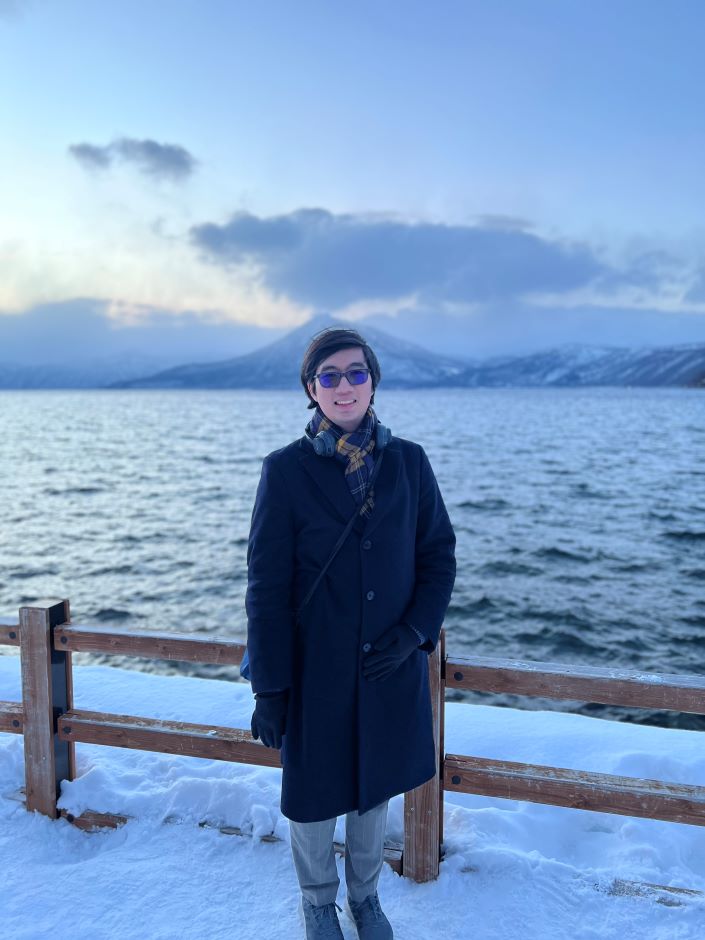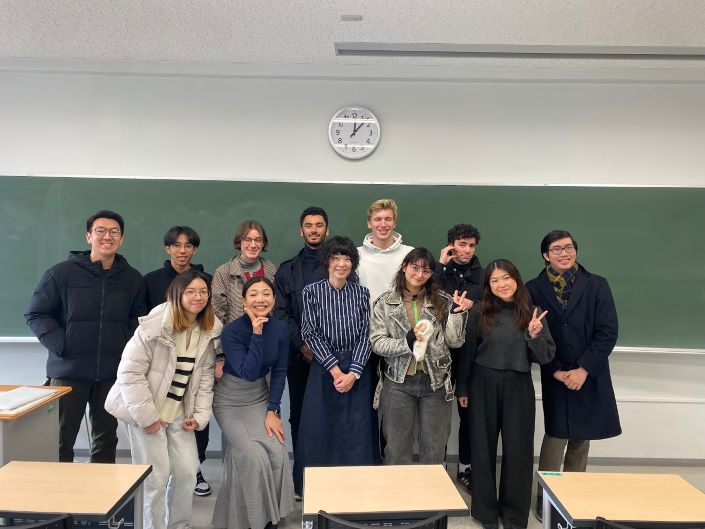6 Tips for a Stellar Study Abroad Scholarship Application
Published Date
Story by:
Media contact:
Topics covered:
Share This:
Article Content
Are you intrigued by the thought of studying, working or teaching abroad? Want to learn about geology in the Swiss Alps, do hands-on research in the Galapagos or analyze the impacts of natural disasters in Taiwan? Then you should think about applying for the Benjamin A. Gilman Scholarship, a distinguished federally funded study abroad program aiming to increase access to global experiences.
Started in 2001, the scholarship program provides historically underrepresented students with the opportunity to study abroad and gain a global perspective. Students who are U.S. citizens and receive the Pell Grant are eligible for the scholarship, and can get up to $5,000 in federal funding toward studying abroad.
With application deadlines in March and October, it’s never too early or too late to apply and get a jumpstart on the global adventure of a lifetime. But, competition can be fierce: approximately one out of four applicants are accepted to the program. UC San Diego is a 20-year Gilman top producer for large institutions, making it the perfect place for you to give it a shot. Preparing a stellar application package is key—here are some tips and tricks for success.
1. Take advantage of available resources
UC San Diego’s Study Abroad Office is well-versed in helping students craft high-quality applications for the Gilman Scholarship. Twenty-seven students from UC San Diego were awarded the scholarship for the last application cycle; the university is a Top 20 Gilman Scholar Producing Institution.
“Throughout January and February, we offer weekly scholarship essay writing workshops,” explained Andra Jacques, the Global Partnerships and Programs Manager at the Study Abroad office. The Study Abroad office partners with the OASIS Language Arts Tutorial Services to offer comprehensive instruction on essay content and structure. Additionally, the staff work one-on-one with students to further develop their essays.
Jacques, a veteran study abroad educator and a two-time Fulbright alum, has worked with hundreds of students to develop their essays. Having also served on the Gilman Scholarship Review Committee, she has unique insight into what makes an application stand out.
“Our 90-minute workshops are really helpful for students to get their brain juices flowing and help them feel less overwhelmed,” Jacques said. “Attendees build mind maps around how a global experience fits into their goals and how to draft a narrative around their past, their present and their hopes for the future. We’ve had a very high application success rate for students who attend the workshops.”
2. Workshop, workshop, workshop
The bulk of the application is the three essays: a personal statement, a statement on building mutual understanding and a follow-on service project proposal. Students often feel daunted by the essays; telling your story in a limited word count can be intimidating. Still, sometimes all it takes to start an impactful essay is just putting words on a page.
“Scholarship committees read a lot of essays; they really want to know who you are and why you’re pursuing study abroad,” Jacques said, noting that the Study Abroad office specializes in helping students determine what parts of their personal journey were critical to where they are now and how to share their story in a compelling way. In addition to Jacques, several other Study Abroad Office Advisors have served on the Gilman Review committee as well.
Don’t be afraid to write, and rewrite. Telling your own story can be tricky and even scary; sometimes, you might need to try again from another angle. After all, the personal statement is meant to be just that—personal.
3. Brainstorm: how does a global experience fit into your life story and future goals?
Another goal of the Gilman Scholarship is to further cross-cultural understanding at home and abroad. Applicants must write a “Building Mutual Understanding” essay focusing on how they will represent themselves and the United States while abroad and what they plan to bring back from their host country to their community and beyond.
Senior Nhat Pham felt overwhelmed when first starting the essay, but ultimately crafted a statement he was proud of. Pham, who is currently studying abroad at Tohoku University in Sendai, Japan through UCEAP's Engineering and Science program, found it helpful to break down his essay into three components: how he would interact with the university and its programs, the university’s culture and possible community service opportunities that could benefit his host city and country, as well as American-Japanese relations.
“I ultimately settled on the theme of connection and adaptability,” Pham explained, noting that he related his experiences as a Vietnamese American to help illustrate his eagerness to learn and adapt to an unfamiliar culture while also showcasing American diversity and goodwill.
His recommendations? After researching the university, program and surrounding area, imagine yourself in the environment and how you might thrive. There’s no one meaning for “building mutual recognition,” and it might look different depending on the country and the program.
“Learning a foreign language is also an act of building mutual recognition, so activities such as language exchange or taking language classes can help one interact with the local students,” Pham said. “Don’t be afraid to be creative in crafting your essay to show your enthusiasm about your chosen program and how you represent American goodwill to the world.”
4. Decide where you want to go. And why you want to go there
When the world is wide and opportunities are everywhere, landing on a host country, city and institution can be difficult. One way to help narrow down your choices is to hone in on your goals for studying abroad and what you hope to get out of the experience.
“Whether it’s research, learning another language or just general academics, consider what countries can help you achieve your goals,” Pham said. He knew he wanted to choose a year-long program with a strong emphasis on research. As a mathematics major, he was interested in working with leading Japanese math professors and experiencing a different math environment than what he’s had in the U.S.

“I was also interested in living in Sendai as well, since it’s not as well-known a city compared to other big cities in Japan,” Pham added. “And, Tohoku University is one of the top public research institutions in Japan, so it also augments my research work quite well.”
5. Establish a clear and specific service project
Just as Gilman Scholars grow personally while abroad, they help their communities grow too. Upon returning home, Gilman Scholars create educational projects reflecting on their time abroad to share with their peers. Applicants submit a project proposal for this “follow-on service project” as part of their application package.
“Students have to think critically about how they want to use their time abroad to offer their community a global perspective,” Jacques said, noting that project proposals might range from information sessions with a church or club to a study abroad blog. “Gilman is really about having this wonderful global experience and encouraging others to join as well.”
Pham designed his project with Poway High School’s AVID program, a system for underserved middle and high school students that aims to help close the achievement gap and prepare students for higher education. An alumnus of his high school’s program and a former AVID tutor, Pham knew that while the program readied students for college, studying abroad wasn’t really talked about as an option. He wants to change that.
“My project focuses on introducing students in AVID to the Gilman Scholarship and inspire the student body to pursue study abroad in college to improve their knowledge and experience in our interconnected world,” Pham said, adding that he hopes to scale his project to be school-wide and potentially district-wide. “For many low-income and first-generation students who are Pell-eligible, I want them to become familiar with Gilman Scholarship and the financial help available to those students”
6. Spend time crafting a strong application
At first glance, the Gilman Scholarship application can seem like an enormous undertaking, especially in the middle of the quarter. Still, Jacques cautions, don’t let writing the essays burden you or discourage you from applying to the scholarship. The time spent crafting a solid application is well worth it for the chance at a $5,000 award and the experience of a lifetime.
“Let’s say you spend 10 hours total working on your Gilman application,” Jacques said. “When you receive the scholarship, you’ll effectively have earned $500 an hour - that’s a great deal. The time commitment on the front end is definitely worth it because the payoff can be great in the end.”

Stay in the Know
Keep up with all the latest from UC San Diego. Subscribe to the newsletter today.



